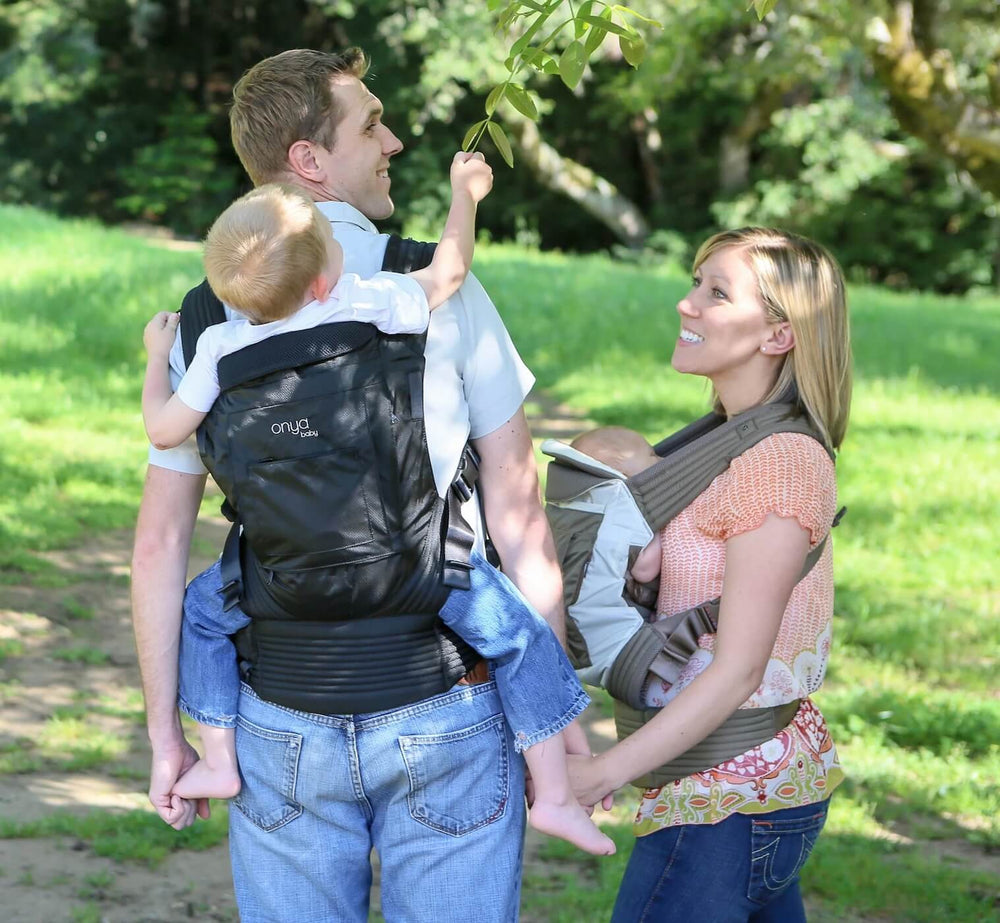Adoption: Bonding Through Babywearing

November is National Adoption Awareness Month, and we’d like to highlight the importance of a good baby carrier as an effective bonding tool for adoptive families.
There are many benefits of babywearing, not the least of which promote bonding and attachment. Many social workers recommend babywearing as an effective way for new adoptive parents and children to bond. One such social worker is Katie Prigel Sharp, LMSW. She’s a social worker, co-owner of Heart of the Matter Seminars and an adoptive parent herself. She encourages babywearing because of its physiological benefits. “It stimulates the vestibular and proprioceptor systems in a way that helps with sensory development,” says Prigel Sharp. (1)
In other words, by carrying your baby in a baby carrier, wrap or sling, you’re allowing her natural freedom of movement (they’re not unnaturally restrained, such as in a plastic holding device, like a car seat, for example). This natural freedom of movement promotes positive development physically, in that your baby will naturally and gently develop her neck and body muscles. When carried upright, she’s exercising her vestibular and neurological systems by the constant stimulation of being integrated into the wearer’s daily life, a side benefit of which is also the fostering of a strong sense of belonging.

The vestibular system is a system of fluid in the inner ear, which regulates the sense of balance during movement, such as when a baby is rocked or carried. Researchers believe that vestibular stimulation has a regulating effect on an infant’s overall physiology and motor development. Faster growths in the babies, a healthier level of oxygen in their blood, and more stable heart rates have been reported as result of vestibular stimulation. By being more in touch with one’s baby, literally and figuratively speaking, a mother can be more receptive to the baby’s needs, diminishing the chances of SIDS, promoting healthy bonding, and leading to a more harmonious relationship between mother and baby. (2) This, of course, applies to a father’s touch, as well.
In addition to the physical, physiological and neurological benefits of babywearing mentioned above, use of a baby carrier can assist in decreasing an adoptive baby’s stress levels. Although it’s not always the case, many adoptive children received less than optimal care during early stages of life, or perhaps suffered prenatal exposure to alcohol, drugs or other toxins. Studies involving children who have experienced early separations from caregivers have suggested that such experiences are often associated with changes in the functioning of the hypothalamus–pituitary–adrenal (HPA) axis. Several research psychologists at the University of Delaware designed a relational intervention that was intended to normalize HPA functioning among children in foster care. They were specifically interested in assessing the effectiveness of a relational intervention, i.e., Attachment and Biobehavioral Catch-up (or “ABC”) with regard to HPA functioning. The ABC intervention was intended to enhance children’s ability to regulate physiology and behavior. Their results suggest that the ABC intervention is effective in helping children regulate biology in ways more characteristic of children who have not experienced early adversity. (3)

By using a baby carrier to provide ample loving touch to their adoptive child, parents are helping their child lessen and learn to regulate stress levels, teaching them that they’re an integrated part of family life, and giving (and receiving) the beautiful, cortisol-inducing cuddles that makes babywearing feel so good.
For all families – adoptive, biological or mixed – try babywearing:
it’s good for the whole family.
Resources:
1. Willard, Laura. Babywearing and Adoption. SheKnows. October 2010
2. Burger, Amanda. A Need for Touch.
3. Dozier, Mary; Peloso, Elizabeth; Lewis, Erin; Laurenceau, Jean-Phillipe and Levine, Seymour. Effects of an Attachment-Based Intervention on the Cortisol Production of Infants and Toddlers in Foster Care. Cambridge Journals Online. Devolpment and Psychopathology. Vol. 20, Issue 03. Summer 2008. pp 845-859








